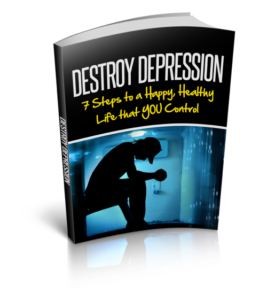Most of us have felt the joy of a romantic relationship. The excitement of being together and the longing while apart can be intense. It feels amazing when we are physically, emotionally and even spiritually connected to another person and that attraction is reciprocated. Everything in life that used to annoy us now seems secondary to this new way of feeling. We wish the whole world could feel this way. It is like a drug and we will do anything to keep experiencing its exhilarating effects. This post is about why romantic breakups hurt so much and what you can do to ease the pain. It is more about those short-term whirlwind romances that can come and go quickly but still leave us devastated. Long term relationships breakups are much more complex and will be the topic of a future post. It is not my intention to reduce romantic relationships to nothing more than a biological response and a bunch of chemicals floating around the brain. It is my hope to at least in part, explain why short-term breakups can hurt so much and why the intensity of emotions can seem disproportional to the length of the relationship.
The Biology of Attraction and Rejection
Recent studies suggest that there is a strong biology in romantic attraction. Falling in love increases levels of dopamine in the brain. Dopamine is associated with increased attention which could in part explain why we can often vividly remember everything our new-found love did or said while we were with them. Another brain chemical norepinephrine is also elevated during romantic attraction. This can further enhance the memory and attraction to our new love interest. Research suggests these chemical increases partially explain why we can’t stop thinking about our love object and why they become so ingrained in our waking thoughts.
So why do breakups hurt so much? The pain seems to permeate every fibre of our being. Even after a short relationship of weeks or months the pain can be so intense we feel like we are going to die. The effect of feel good brain chemicals could explain some of the pain. Coming down from a high is always going to hurt regardless of whether that high is produced internally or externally. However, there is also another factor that can increase the pain of breakups or rejection and it too is biological.
Humans are social creatures. We need to feel connected and a part of society. This is not only for our emotional well being but also for our physical survival. Evolutionary psychology suggests that when we are rejected our brains can interpret this as life threatening. Being excluded or shunned from our group or tribe in the past was effectively a death sentence as people could not survive on their own. Our emotional brains can’t always tell the difference between an unfortunate situation and a life threatening one. One study found that the same parts of the brain that experience physical pain also are active when feeling social or romantic rejection. Hence the feeling that we are going to die after a breakup is in some sense very real.
How Can I Feel Better?
Some of you may be wondering how does knowing this help me to feel better? Often when people are feeling intense emotions, especially negative ones it is helpful to understand why. When speaking to people who are hurting from a breakup one of the most often asked questions, usually through a vale of tears is, why does it hurt so much? Biology explains some of these reasons and may also hold the key to recovery and the easing of pain. Normalising an experience can help take the edge of negative feelings. No, you are not crazy, what you are feeling is understandable. It is distressing but not dangerous. Additionally, increasing our existing social bonds can help counteract the influence of the emotional brain that is interpreting the event as life threatening. It can also be helpful to remind yourself that you are feeling this way over someone you didn’t even know existed a few weeks or months ago. Here are a few strategies that may be helpful.
Understand the Pain:
Understanding why it hurts so much can in part reduce the intensity of the feelings. Hopefully some of the science behind breakups presented in this post can help you realise that the pain is normal.
Talk about it:
Don’t underestimate the power of talking about how you feel. A good friend or a counsellor can be very helpful when dealing with the loss of a relationship. It can also be a good alternative to the temptation to contact your lost love. Crisis support phone lines can also be helpful if your mental health has been severely compromised due to the breakup. (See: Helplines in the main menu)
Reconnect with yourself and others:
Often, we can lose ourselves in a romantic partner. Trying to reconnect with yourself can be helpful in healing from a breakup. Remind yourself that you are a whole person and you didn’t lose yourself when you lost your love. As social creatures it is important to stay connected with friends and family where possible. When another person becomes our sole focus often we can neglect those other relationships. Reconnecting socially can be very healing as well as a welcome distraction.
Look for the positives:
There are both positive and negatives to being single or in a relationship. Look at the things you enjoyed as a single person and try and focus on the opportunities and freedom of not being in a relationship.
It is not forever:
They say there are three certainties in life, death, taxes and change. The last one, change, is as inevitable as the first two. This is not forever. The feelings will fade, and life will once again return to normal. It won’t always feel this way. You’ve got this.
Wishing you all the best in your journey
Phil Miranda
Sources:
Fisher, H. (2000). Lust, attraction, attachment: Biology and evolution of the three primary emotion systems for mating, reproduction, and parenting. Journal of Sex Education & Therapy, 25(1), 96-104.
Kross, E., Berman, M. G., Mischel, W., Smith, E. E., & Wager, T. D. (2011). Social rejection shares somatosensory representations with physical pain. Proceedings of the National Academy of Sciences, 108(15), 6270-6275.



